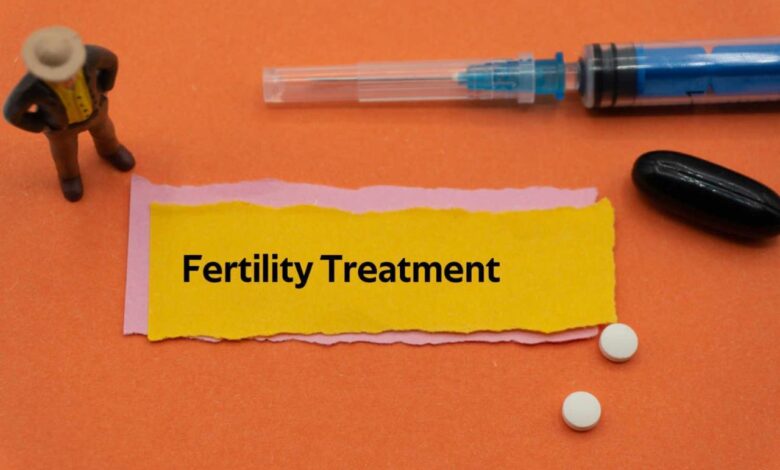Tech-Supported Fertility Treatments Hope Or Hype?

Tech-Supported Fertility Treatments: Hope or Hype? This question resonates deeply in today’s society as medical technology continues to evolve and offer new possibilities for individuals facing infertility challenges. From in vitro fertilization (IVF) to advanced genetic screening, these treatments have transformed the landscape of reproductive health, providing hope to many who dream of starting a family. Yet, as these innovative technologies grow in prevalence, it’s essential to explore not just their benefits, but also the implications they carry for patients and society.
As we delve into the world of tech-supported fertility treatments, we’ll examine the various methods available, the evidence supporting their effectiveness, and the emotional journeys of those who have experienced them. We will also discuss the ethical considerations that come into play and what the future may hold for fertility treatments.
Introduction to Tech-Supported Fertility Treatments

Tech-supported fertility treatments have emerged as a beacon of hope for many individuals and couples struggling with infertility. These treatments leverage advanced technologies to enhance reproductive options, providing support at various stages of conception and pregnancy. The purpose of these innovations is to address complex reproductive health challenges, offering personalized and effective solutions tailored to individual needs.
Significant advancements in reproductive technology have transformed the landscape of fertility treatments. In vitro fertilization (IVF), genetic testing, and cryopreservation are just a few examples of how technology has revolutionized the approach to conception. With the integration of artificial intelligence (AI) and machine learning, fertility clinics are now able to analyze patient data more effectively, improving the chances of successful pregnancies. Additionally, wearable technology and mobile health applications are providing patients with more control over their reproductive health, allowing for better tracking of ovulation cycles and hormone levels.
Increasing Prevalence of Tech-Supported Fertility Treatments
The rise in the use of tech-supported fertility treatments is a reflection of changing societal norms and increased awareness about reproductive health. More individuals and couples are seeking assistance due to factors such as delayed parenthood, lifestyle choices, and medical conditions affecting fertility. This growing demand has led to a proliferation of fertility clinics and services worldwide, making these treatments more accessible.
A few key factors contributing to the increased prevalence of these treatments include:
- Societal shifts: As more people focus on career development and personal goals, many are choosing to delay starting a family, leading to higher rates of infertility.
- Awareness and education: Increased public awareness regarding reproductive health has resulted in more individuals seeking assistance earlier in their fertility journeys.
- Technological innovations: Continuous advancements in reproductive technologies make treatments more effective and less invasive, appealing to a broader audience.
- Insurance coverage: As more insurance plans begin to cover fertility treatments, financial barriers are lowered, encouraging more people to explore their options.
The combination of these factors illustrates a notable shift in how society approaches family planning and fertility, making tech-supported treatments a crucial component of modern reproductive health.
Types of Tech-Supported Fertility Treatments
The realm of fertility treatments has evolved dramatically with the integration of technology. Tech-supported fertility treatments offer various options to couples facing challenges in conceiving. Understanding these treatments is crucial for making informed decisions about family planning. This section delves into some prominent types of tech-supported fertility treatments, along with their processes, success rates, and costs.
In Vitro Fertilization (IVF)
In Vitro Fertilization (IVF) is one of the most recognized fertility treatments, involving the retrieval of eggs and sperm, fertilization in a laboratory setting, and then transferring the resulting embryos into the uterus. The process typically involves several steps, including ovarian stimulation, egg retrieval, fertilization, embryo culture, and embryo transfer.
Intracytoplasmic Sperm Injection (ICSI)
ICSI is a specialized form of IVF, where a single sperm is injected directly into an egg to facilitate fertilization. This method is particularly beneficial for couples with male fertility issues, such as low sperm count or motility.
Egg Freezing
Egg freezing, or oocyte cryopreservation, allows women to preserve their eggs for future use. This procedure is ideal for women who wish to delay childbirth for personal, medical, or professional reasons. The eggs are retrieved, frozen using rapid cooling techniques, and stored until they are needed.
Success Rates and Cost Overview
The success rates and costs of these treatments can vary based on multiple factors, including the age of the patient and the specific fertility issues being addressed. Below is a summary table detailing the processes, average success rates, and approximate costs associated with each treatment.
| Treatment | Process | Success Rate | Cost (USD) |
|---|---|---|---|
| IVF | Ovarian stimulation, egg retrieval, fertilization, embryo transfer | 40-50% (under 35 years) | $12,000 – $15,000 per cycle |
| ICSI | Egg retrieval, sperm injection, embryo transfer | 45-65% (depends on sperm quality) | Additional $1,500 – $3,000 to IVF |
| Egg Freezing | Ovarian stimulation, egg retrieval, freezing | Varies (depends on quality) | $6,000 – $15,000 per cycle |
Evaluating Treatment Effectiveness
Evaluating the effectiveness of different tech-supported fertility treatments involves analyzing several key factors. These include success rates based on age and health conditions, patient reviews, and ongoing advancements in technology.
“Success rates for IVF can dramatically improve with age-appropriate strategies and personalized treatment plans.”
It is also essential to consider the emotional and psychological aspects of the treatments, as they can significantly impact a couple’s journey. Engaging with a fertility specialist and making use of statistical data from reputable sources can help in choosing the right treatment option tailored to individual needs.
Impact of Technology on Fertility Success Rates
Over the years, technological advancements have significantly reshaped the landscape of fertility treatments, leading to improved success rates for couples facing infertility challenges. As science evolves, new methods and tools have emerged, providing hope and support to those trying to conceive. This segment delves into how technology has influenced fertility success, exploring specific innovations and statistical trends that highlight this progress.
Technologies Contributing to Increased Success Rates
Several key technologies have played a crucial role in enhancing fertility treatment success rates. These innovations have not only streamlined the process but also increased the chances of successful pregnancies. Understanding these technologies sheds light on how they have transformed fertility care.
- In Vitro Fertilization (IVF): IVF has revolutionized fertility treatment by allowing eggs to be fertilized outside the body. Over the last few decades, the success rates of IVF have risen significantly, with recent statistics showing a live birth rate of approximately 40% for women under 35 years of age.
- Intracytoplasmic Sperm Injection (ICSI): This technique, introduced in the 1990s, involves injecting a single sperm directly into an egg, addressing male infertility issues. The integration of ICSI has contributed to success rates of around 25-30% in men with severe sperm deficiencies.
- Preimplantation Genetic Testing (PGT): PGT allows for the genetic screening of embryos before implantation, reducing the risk of genetic disorders. Studies have shown that using PGT can increase the chances of a successful pregnancy by up to 70% for couples with known genetic issues.
- Frozen Embryo Transfer (FET): The option to freeze and later transfer embryos has become a standard practice, improving the chances of pregnancy. Data indicates that frozen embryo transfers can lead to higher birth rates compared to fresh transfers, often exceeding 50% in some age groups.
“The success rates of fertility treatments have nearly doubled over the past three decades, thanks to technological advancements and refined techniques.”
In addition to these technologies, advancements in monitoring and diagnostic tools, such as ultrasound and hormone profiling, have enhanced the ability to tailor treatment plans specific to individual patient needs. This personalized approach has also contributed to higher success rates, emphasizing the importance of integrating technology into fertility care. According to the Centers for Disease Control and Prevention (CDC), the overall success rate for all IVF cycles in the United States has increased from about 20% in the early 1990s to over 30% in recent reports, showcasing a remarkable journey of improvement fueled by technology.
Ethical Considerations Surrounding Tech-Supported Fertility Treatments
The rise of technology in fertility treatments has brought forth significant advancements, but it also raises complex ethical dilemmas that deserve careful consideration. As couples navigate the challenges of infertility, the decisions they face in utilizing these technologies can have profound implications not only for themselves but also for future generations. Understanding these ethical issues is essential for informed decision-making in the realm of reproductive health.
The ethical landscape surrounding tech-supported fertility treatments is intricate, primarily due to the capabilities that advanced reproductive technologies (ART) possess. These include in vitro fertilization (IVF), preimplantation genetic testing (PGT), and embryo selection. Such technologies offer the promise of enhanced chances of conception and the ability to screen for genetic disorders, but they also prompt discussions about the moral implications of ‘designing’ future children. The ability to select embryos based on genetic traits raises questions about eugenics and the socio-cultural ramifications of creating idealized versions of human life.
Implications of Selecting Embryos and Genetic Screening
The implications of embryo selection and genetic screening are significant, impacting not just the individuals undergoing treatment but society as a whole. These technologies allow parents to choose embryos free from specific genetic disorders, which is undeniably beneficial. However, this capability can lead to ethical concerns regarding the potential for discrimination against embryos with disabilities or non-preferred traits.
The practice of screening embryos can contribute to a societal divide, where certain genetic attributes are valued over others. Consequently, parents may feel pressure to select embryos based on traits perceived as desirable, such as intelligence or physical appearance, leading to ethical dilemmas about the nature of parenthood and the value of diversity. This raises critical questions about what it means to be ‘normal’ and how society defines worth, which can perpetuate stigma against those with disabilities or non-conforming traits.
“The ability to select embryos raises questions about eugenics and the socio-cultural ramifications of creating idealized versions of human life.”
Moreover, the process of embryo selection often involves significant emotional and psychological implications for parents. The experience of having to choose among embryos can lead to stress and feelings of guilt, particularly when rejecting embryos that could potentially lead to a healthy life.
Cultural Perspectives on Fertility Treatments and Ethical Implications
Cultural perspectives significantly influence the ethical considerations surrounding fertility treatments, with varying interpretations and acceptance levels across different societies. In some cultures, fertility treatments are embraced and seen as a path to family fulfillment, while in others, they may be viewed with skepticism or even opposition.
For instance, in Western cultures where individual choice and reproductive autonomy are emphasized, technologies like IVF and genetic screening are often accepted and integrated into healthcare systems. However, in certain conservative cultures, such practices may be frowned upon due to religious or traditional beliefs that favor natural conception. This can lead to friction between modern medical practices and long-standing cultural norms.
In addition, the ethical implications of fertility treatments can differ based on societal values related to family structure, gender roles, and the definition of parenthood. Cultures that prioritize lineage and ancestry may place a higher moral weight on natural conception, while others may champion scientific advancements as a means to overcome biological limitations.
“Cultural perspectives significantly influence the ethical considerations surrounding fertility treatments, with varying interpretations and acceptance levels across different societies.”
Navigating these cultural landscapes requires sensitivity and understanding, as differing values can shape individuals’ experiences and decisions regarding fertility treatments. The interplay of technology, ethics, and culture presents a complex tapestry that healthcare providers and patients must consider when engaging with tech-supported fertility options.
Patient Experiences and Emotional Impact

The journey through tech-supported fertility treatments is not only about medical procedures but also encompasses a deeply emotional experience for many individuals and couples. The hope of starting or expanding a family can be both exhilarating and overwhelming, leading to a range of feelings throughout the process. Understanding these experiences can provide insight into the personal dimensions of fertility treatments.
Patients undergoing these treatments often share powerful narratives that reflect their emotional highs and lows. Many report a mix of hope, anxiety, and uncertainty as they navigate through various stages of fertility technology, from initial consultations to the final stages of treatment. For instance, a woman named Sarah shared her experience of undergoing in vitro fertilization (IVF), describing it as a rollercoaster ride of emotions. “You have moments of excitement when you think, ‘This could work!’ followed by crushing disappointments when it doesn’t,” she recalled, emphasizing the intense emotional investment involved.
Common Psychological Challenges Faced by Patients
It’s crucial to acknowledge the psychological challenges that can surface during fertility treatments. The emotional toll can be significant, affecting mental health and relationships. Several common issues arise, and understanding these can help in providing necessary support.
The following points illustrate the psychological hurdles faced by many undergoing tech-supported fertility treatments:
- Anxiety: The uncertainty of outcomes and the fear of not achieving pregnancy can lead to heightened anxiety levels.
- Depression: Persistent disappointment and the emotional strain of repeated treatments may result in feelings of sadness or depression.
- Isolation: Many patients feel alone in their journey, as friends and family may not fully understand the emotional weight of fertility struggles.
- Relationship Strain: The stress of treatment can cause tension between partners, leading to conflicts or feelings of disconnect.
- Body Image Issues: Hormonal treatments and the physical changes they bring can impact self-esteem and body perception.
Recognizing these challenges is vital for both patients and their support systems, as it encourages open dialogue and fosters a supportive environment during the often-tumultuous journey of fertility treatments.
“Fertility treatment is not just a medical journey; it’s an emotional odyssey that requires resilience and support.”
Through the shared testimonials and the exploration of psychological challenges, it becomes evident that the emotional impact of tech-supported fertility treatments is profound and multifaceted. This understanding can help guide patients towards better coping strategies and necessary support systems.
Future Trends in Tech-Supported Fertility Treatments: Tech-Supported Fertility Treatments: Hope Or Hype?
The landscape of fertility treatments is rapidly evolving, propelled by technological advancements and innovative approaches. As we look to the future, several trends are set to shape the way individuals and couples experience fertility treatments, ultimately enhancing success rates and accessibility. Understanding these future trends is crucial for those considering their options in fertility care.
Emerging technologies are positioned to revolutionize fertility treatments. Innovations already in motion are paving the way for enhanced diagnosis, treatment personalization, and improved patient outcomes.
Advancements in Genetic Testing and Artificial Intelligence
Genetic testing is on the brink of significant transformation, with advancements in sequencing technologies allowing for more comprehensive analyses of embryos. Integrating artificial intelligence into fertility clinics will enable more accurate predictions of embryo viability and personalized treatment plans tailored to individual genetic profiles.
The implications of these advancements are profound. For instance, algorithms can analyze data from numerous cycles to enhance predictions about success rates for specific patients, making treatments more efficient and focused.
Integration of Wearable Technology
Wearable technology is becoming an increasingly valuable tool in fertility treatments. Devices that monitor hormonal levels, menstrual cycles, and ovulation patterns can provide real-time data that aids in timing interventions more effectively.
This technology empowers patients with insights into their reproductive health. For example, a device that tracks basal body temperature alongside hormonal changes can help predict ovulation with higher accuracy, thereby enhancing the chances of conception during optimal windows.
Telehealth and Remote Monitoring
The shift towards telehealth is set to expand in the realm of fertility treatments, allowing patients to receive consultations, monitoring, and support from the comfort of their homes. This model not only increases accessibility for patients in remote areas but also reduces the emotional and financial burden associated with frequent clinic visits.
Remote monitoring solutions can facilitate continuous engagement, where patients can report symptoms or responses to treatment through apps, enabling physicians to make timely adjustments to protocols without in-person visits.
Societal Impacts of Advanced Fertility Treatments
The widespread adoption of advanced fertility treatments is likely to have significant societal ramifications. As technology makes fertility treatments more effective and accessible, we may witness shifts in family planning dynamics.
For instance, increased success rates in vitro fertilization (IVF) and genetic testing could lead to a surge in late parenthood, as individuals feel more confident in their ability to conceive later in life. Additionally, with greater access to treatments, there may be a rise in diverse family structures, including single parents and same-sex couples utilizing fertility services to build families.
The intersection of technology and fertility treatments not only promises advancements in success rates but also poses important questions about societal norms and family dynamics in the future.
Resources and Support for Patients
Navigating the world of tech-supported fertility treatments can be daunting. Patients often find themselves overwhelmed by the emotional and physical challenges associated with these processes. It is vital to tap into the various resources available to support individuals and couples on this journey. From educational materials to emotional support networks, numerous organizations and services can provide guidance and comfort.
Accessing the right resources can significantly enhance the experience of those undergoing fertility treatments. These resources not only offer information about available options but also connect patients with communities that understand their struggles. Here are some valuable resources and support systems:
Support Groups and Online Communities, Tech-Supported Fertility Treatments: Hope or Hype?
Support groups and online forums can be vital for individuals undergoing fertility treatments. They provide safe spaces for sharing experiences, gaining insights, and fostering connections with others in similar situations. Many find comfort in knowing they are not alone in their struggles. Key resources include:
- Resolve: The National Infertility Association – This organization offers local support groups, online forums, and educational resources tailored to those experiencing infertility.
- Fertility Network UK – A charity based in the UK providing support, advice, and information for those dealing with fertility issues, including various online support groups.
- FertilityFriend.com – An online community that offers forums, articles, and tools for tracking fertility treatment progress and connecting with others.
Counseling Services
Counseling plays a crucial role in helping individuals cope with the emotional turmoil that can accompany fertility treatments. Professional support can provide coping strategies, emotional validation, and personalized solutions. Some notable counseling resources are:
- The American Society for Reproductive Medicine (ASRM) – Offers a directory of mental health professionals specializing in reproductive health.
- Fertility Counseling – A resource for finding counselors with experience in fertility-related issues, offering both in-person and virtual sessions.
- BetterHelp – An online platform connecting users with licensed therapists who can address fertility-related challenges.
Educational Organizations
Several organizations are dedicated to educating the public about fertility treatments, helping patients make informed decisions. These entities provide comprehensive information on various treatment options, potential risks, and success rates. Some prominent organizations include:
- The American Society for Reproductive Medicine (ASRM) – Offers extensive educational resources on various aspects of reproductive health, including treatments and advancements in technology.
- Resolve: The National Infertility Association – In addition to support, they provide valuable educational materials on infertility and fertility treatments.
- Infertility Awareness Association of Canada – Provides resources and information about fertility awareness and support options available in Canada.
Final Wrap-Up
In summary, the exploration of Tech-Supported Fertility Treatments: Hope or Hype? reveals a complex interplay between technological advancement and personal experience. While these treatments have brought forth significant improvements in success rates and options for individuals, they also raise ethical questions and emotional challenges that must not be overlooked. As we look to the future, ongoing innovation in this field promises to further shape the way we understand and approach fertility, making it crucial to stay informed and engaged in the conversation.
Q&A
What are the most common types of tech-supported fertility treatments?
The most common types include in vitro fertilization (IVF), intracytoplasmic sperm injection (ICSI), and egg freezing.
How successful are tech-supported fertility treatments?
Success rates vary based on the treatment type, age, and other factors, but advancements have generally increased success over the years.
Are there risks associated with these treatments?
Yes, potential risks can include multiple pregnancies, ovarian hyperstimulation syndrome, and emotional stress.
How much do tech-supported fertility treatments typically cost?
Costs can vary widely based on location and treatment type, often ranging from a few thousand to tens of thousands of dollars.
What support resources are available for patients?
Patients can access support groups, counseling services, and online forums dedicated to fertility issues.






